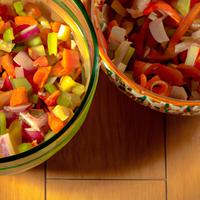
1 serving (100 grams) contains 50 calories, 2.0 grams of protein, 0.2 grams of fat, and 10.0 grams of carbohydrates.

Log this food in SnapCalorie

Nutrition Information
Calories |
119.0 | ||
|---|---|---|---|
% Daily Value* |
|||
| Total Fat | 0.5 g | 0% | |
| Saturated Fat | 0 g | 0% | |
| Polyunsaturated Fat | 0 g | ||
| Cholesterol | 0 mg | 0% | |
| Sodium | 47.6 mg | 2% | |
| Total Carbohydrates | 23.8 g | 8% | |
| Dietary Fiber | 7.1 g | 25% | |
| Sugars | 7.1 g | ||
| protein | 4.8 g | 9% | |
| Vitamin D | 0 mcg | 0% | |
| Calcium | 71.4 mg | 5% | |
| Iron | 2.4 mg | 13% | |
| Potassium | 714.3 mg | 15% | |
* Percent Daily Values are based on a 2,000 calorie diet. Your daily values may be higher or lower depending on your calorie needs.
Food Attributes
Source of Calories
About Diced veggie
Diced Veggie is a versatile mix of chopped vegetables, typically including bell peppers, onions, carrots, zucchini, and celery, among others. Popular in numerous cuisines, this medley forms the base for dishes spanning from hearty soups to vibrant stir-fries. With roots in global culinary traditions, diced vegetables are particularly prominent in Mediterranean, Asian, and Latin American cooking. Packed with essential vitamins like A and C, fiber, and antioxidants, they contribute to improved digestion, boosted immunity, and overall health. Low in calories and free from unhealthy fats, they are a perfect choice for weight-conscious or health-focused eaters. However, nutritional value also depends on preparation methods—diced veggies sautéed in excessive oil or paired with rich sauces can reduce their health benefits. Whether raw, roasted, or lightly cooked, diced vegetables add flavor, texture, and nutrients to any dish, making them a staple for wholesome meals.



